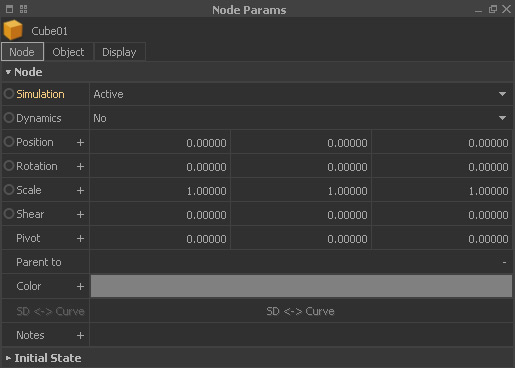Simulation States: Basics
Simulation States: Basics
Sometimes it is necessary to exclude a scene element from a simulation temporarily. This is often the case with helper objects, emitters, or daemons. RealFlow provides an one-click method for changing between different simulation states. Of course, these state can be animated and this way it is possible to activate a node at any time during simulation.
The Rocket Icon
- A node's simulation state is represented by a rocket icon. This icon can be found in the icon bar, but also in the “Nodes” panel, where every entry has its own rocket symbol.
- Click on the icon to switch between “Active” (green), “Inactive” (red), and “Cache” (yellow).
- “Cache” requires an already existing simulation. When enabled RealFlow will read the simulated data from disk. → Cached nodes are able to influence other active nodes/particles, but they cannot be influenced themselves.
- Multi-node selections are allowed and you can change the state of several nodes at once.
The “Simulation” Parameter
- This parameter is located here: Node Params > Node > Simulation
- “Simulation” represents the states of the rocket icon: when the rocket is red “Simulation” will be set to “Inactive”, for example.
In contrast to the icon, the parameter can be animated:
- Right-click on “Simulation” and choose “Edit Curve...”
- Go to the empty line at the bottom of the appearing → “Curve Editor”. There, an → expression can be added – this is the most effective way of animating simulation states.
- Change from active to inactive at a certain frame, e.g. 50:
if(f>49,0,1) - Change from inactive to active at frame 50:
if(f>49,1,0) - Change from cache to inactive at frame 50:
if (f>49,0,2)
These are the numerical representations of the simulation states:
- 0 = inactive
- 1 = active
- 2 = cache
It is also possible to define a point in time in seconds instead of frames. In the following expression, the state is changed from active to inactive at t = 2.5 seconds:
if(t>2.5,0,1)
, multiple selections available,
Related content
Simulation States: Cache
Simulation States: Cache
More like this
Simulate, Reset, Initial States
Simulate, Reset, Initial States
More like this
Simulation Flow
Simulation Flow
More like this
Simulation Flow (SF)
Simulation Flow (SF)
More like this
Command Line Simulations
Command Line Simulations
More like this
Nodes
More like this


